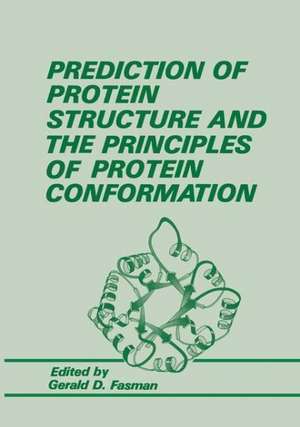Prediction of Protein Structure and the Principles of Protein Conformation
Editat de G.D. Fasmanen Limba Engleză Paperback – 8 feb 2012
| Toate formatele și edițiile | Preț | Express |
|---|---|---|
| Paperback (1) | 1844.19 lei 6-8 săpt. | |
| Springer Us – 8 feb 2012 | 1844.19 lei 6-8 săpt. | |
| Hardback (1) | 1857.47 lei 6-8 săpt. | |
| Springer Us – 30 oct 1989 | 1857.47 lei 6-8 săpt. |
Preț: 1844.19 lei
Preț vechi: 2249.01 lei
-18% Nou
Puncte Express: 2766
Preț estimativ în valută:
352.92€ • 366.22$ • 294.99£
352.92€ • 366.22$ • 294.99£
Carte tipărită la comandă
Livrare economică 17-31 martie
Preluare comenzi: 021 569.72.76
Specificații
ISBN-13: 9781461288602
ISBN-10: 1461288606
Pagini: 816
Ilustrații: XIV, 798 p.
Dimensiuni: 178 x 254 x 43 mm
Greutate: 1.39 kg
Ediția:Softcover reprint of the original 1st ed. 1989
Editura: Springer Us
Colecția Springer
Locul publicării:New York, NY, United States
ISBN-10: 1461288606
Pagini: 816
Ilustrații: XIV, 798 p.
Dimensiuni: 178 x 254 x 43 mm
Greutate: 1.39 kg
Ediția:Softcover reprint of the original 1st ed. 1989
Editura: Springer Us
Colecția Springer
Locul publicării:New York, NY, United States
Public țintă
ResearchDescriere
The prediction of the conformation of proteins has developed from an intellectual exercise into a serious practical endeavor that has great promise to yield new stable enzymes, products of pharmacological significance, and catalysts of great potential. With the application of predic tion gaining momentum in various fields, such as enzymology and immunology, it was deemed time that a volume be published to make available a thorough evaluation of present methods, for researchers in this field to expound fully the virtues of various algorithms, to open the field to a wider audience, and to offer the scientific public an opportunity to examine carefully its successes and failures. In this manner the practitioners of the art could better evaluate the tools and the output so that their expectations and applications could be more realistic. The editor has assembled chapters by many of the main contributors to this area and simultaneously placed their programs at three national resources so that they are readily available to those who wish to apply them to their personal interests. These algorithms, written by their originators, when utilized on pes or larger computers, can instantaneously take a primary amino acid sequence and produce a two-or three-dimensional artistic image that gives satisfaction to one's esthetic sensibilities and food for thought concerning the structure and function of proteins. It is in this spirit that this volume was envisaged.
Cuprins
1. Principles and Patterns of Protein Conformation.- 2. The Structure of the Photochemical Reaction Center of Rhodopseudomonas viridis and Its Implications for Function.- 3. Virus Structure.- 4. Protein Stability and Function: Theoretical Studies.- 5. Stabilization Energies of Protein Conformation.- 6. The Development of the Prediction of Protein Structure.- 7. The Role of Energy Minimization in Simulation Strategies of Biomolecular Systems.- 8. The Role of Electrostatic Interactions in the Structure of Globular Proteins.- 9. Chou-Fasman Prediction of the Secondary Structure of Proteins: The Chou-Fasman-Prevelige Algorithm.- 10. The GOR Method for Predicting Secondary Structures in Proteins.- 11. Prediction of Packing of Secondary Structure.- 12. Prediction of Protein Structural Classes from Amino Acid Compositions.- 13. Use of Class Prediction to Improve Protein Secondary Structure Prediction: Joint Prediction with Methods Based on Sequence Homology.- 14. Redundancies in Protein Sequences.- 15. The Hydrophobicity Profile.- 16. Hydrophobic Moments as Tools for Analyzing Protein Sequences and Structures.- 17. Tertiary Structure Prediction.- 18. Structure Prediction for Membrane Proteins.- 19. Identification of Membrane Proteins and Soluble Protein Secondary Structural Elements, Domain Structure, and Packing Arrangements by Fourier-Transform Amphipathic Analysis.- 20. Guide for Studies on Structure and Function Employing Synthetic Polypeptides.- Appendixes (included in Chapter 6).- Appendix 1: List of Reviews on Protein Folding and Prediction of Secondary and Tertiary Structure.- Appendix 2: Programs Available through This Publication for Protein Secondary Structure Prediction.- Appendix 3: Commercially Available Programs.- Appendix 4: Relevant Programs Described in the Literature.- Appendix 5: National Resource Data Bases.











